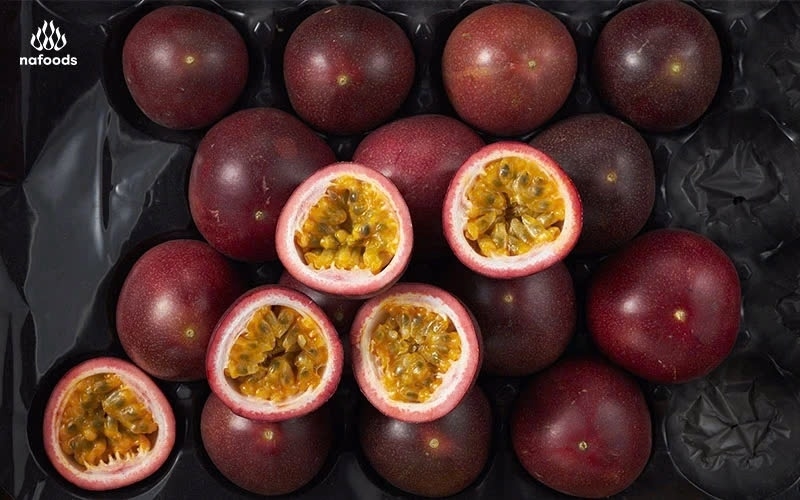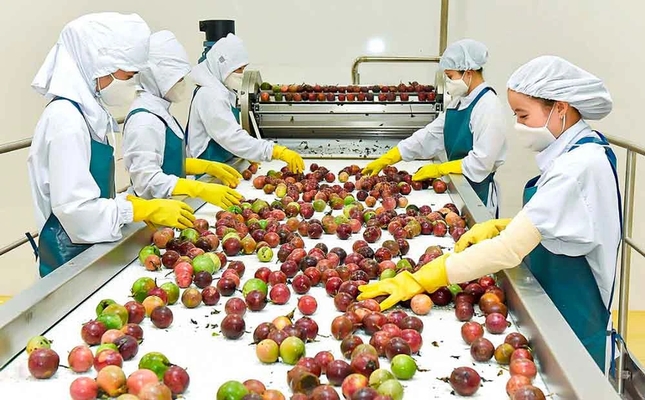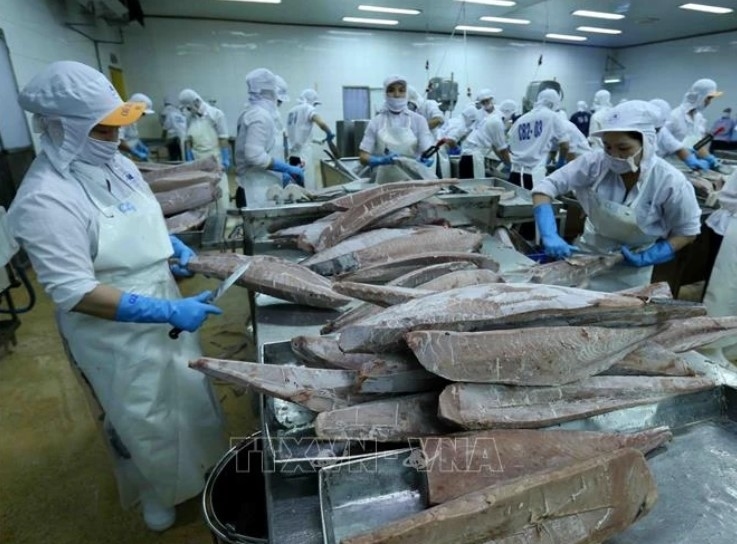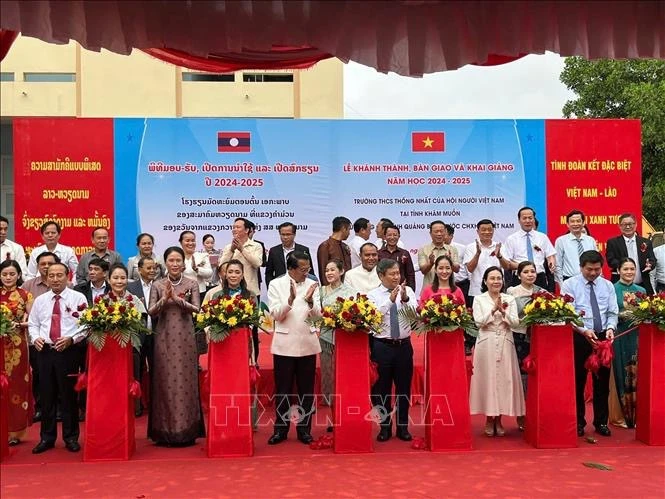 |
| Vietnam ranks among the top 10 largest producers and exporters of passion fruit in the world, after Brazil, Colombia, Ecuador, and Peru. (Photo: Nafoods) |
The Vietnamese Ministry of Agriculture and Rural Development and the US Department of Agriculture have recently completed technical negotiations and are now moving on to legal procedures necessary to allow the import of Vietnamese passion fruit into the US market.
“The Vietnamese fruit has been exported to the European market for over a decade, therefore, it is not a significant challenge for Vietnamese enterprises to meet the standards of the US market,” said Ho Bao, director of Van Xuan Agri JSc in Dak Nong Province.
However, fresh Vietnamese fruits exported to the US must undergo irradiation treatment, which incurs a high cost – a factor that can impact their competitiveness compared to South American countries that benefit from logistical advantages in getting their products into the US.
In addition, passion fruit has a short shelf life, which currently prevents it from being shipped in containers by sea. Meanwhile, fresh passion fruit exported via air freight costs approximately US$3 per kilogram, reducing business competitiveness compared to South American rivals.
“The upcoming export of passion fruit to the US is encouraging news for farmers and businesses, as it will expand the market and increase export revenue for the fruit. If the issue of storage technology can be resolved, allowing passion fruit to be shipped to the US by sea and thus reducing shipping costs, its competitiveness will significantly improve,” Bao told thanhnien.vn.
 |
| Vietnam expects to earn US$100 million each year from passion fruit exports to US market. (Photo: TPO) |
Dang Phuc Nguyen, secretary-general of the Vietnam Fruit and Vegetable Association (Vinafruit), stated that passion fruit has consistently ranked among the top 10 high-value export fruits for many years. In 2023 alone, the export value of passion fruit reached over US$222 million. Currently, European countries are the largest market for frozen passion fruit products.
In his view, the US is also a significant market for fresh passion fruit and processed, frozen passion fruit products from Vietnam. He predicted that the annual export value of the fruit could reach between US$50 -100 million.
According to the Ministry of Agriculture and Rural Development, Vietnam currently has nearly 9,500 hectares of land under passion fruit cultivation, producing nearly 190,000 tonnes annually. Passion fruit is among the 18 fruit varieties with an annual production output exceeding 100,000 tonnes. Notably, 80% of the annual harvest is purchased by enterprises for processing and export.
Vietnam ranks among the top 10 largest producers and exporters of passion fruit in the world, after Brazil, Colombia, Ecuador, and Peru.
The Vietnamese fruit is being exported to markets with stringent quality, phytosanitary, and food safety requirements, such as Australia, France, Germany, the Netherlands, the Republic of Korea, China, and Switzerland.
Nguyen Manh Hieu, head of the Post-Harvest Technology Department at the Institute of Agricultural Engineering and Post-Harvest Technology (VIAEP), said that passion fruit, along with durian, mango, and pomelo, is one of the four key fruit crops with significant export potential to the US and European countries.
Since 2020, the United Nations Industrial Development Organization (UNIDO) and the Swiss Government have implemented a US$1.5 million project to support Vietnam in enhancing its capacity to meet standards and quality requirements for its tropical fruit varieties, including passion fruit, to be exported to the US, European and Australian markets.
“Advanced preservation technologies will be applied to extend the shelf life of passion fruit from 35 to 50 days, meeting the requirements for sea transport to various markets,” said Hieu.
Agro-forestry-fisheries trade surplus booms over 68% in eight months
Vietnam has recorded US$11.8 billion in agro-forestry-fisheries trade surplus over the first eight months of 2024, surging 68.4% year on year, reported the Voice of Vietnam based on statistics from the Ministry of Agriculture and Rural Development (MARD).
 |
| Illustrative photo (Source: VNA) |
Meanwhile, exports of these commodities brought home about US$40.08 billion during the period, rising 18.6% from a year earlier. That included some US$5.55 billion in August, up 12.3%.
The MARD attributed the eight-month result to export increases across the scope of trade items. In particular, revenue from farm produce grew 24% to US$21.32 billion, forestry products 19.7% to US$10.97 billion, fishery products 7.6% to US$6.23 billion, and animal products 0.3% to US$324 million.
Some commodities posting high export turnover are timber and wood products US$10.24 billion, up 20.6%; coffee US$4.03 billion, up 36.1%; rice nearly US$3.85 billion, up 21.7%; fruits and vegetables US$4.63 billion, up 30.6%; shrimp US$2.4 billion, up 9.5%; and tra fish US$1.19 billion, up 8.2%.
The US, China, and Japan remain the three largest importers of agro-forestry-fisheries products from Vietnam. Particularly, exports to the US have risen 23.5%, China 10.2%, and Japan 4.6%, statistics show.
MARD Deputy Minister Phung Duc Tien said that aside from major and key markets like China, the US, Japan, and the EU, the agricultural sector is actively coordinating with businesses to explore new and potential markets such as the Islamic, Middle Eastern, and African countries.
Notably, he added, it is assisting companies to make use of free trade agreements, especially the Comprehensive and Progressive Agreement for the Trans-Pacific Partnership (CPTPP) and the EU - Vietnam Free Trade Agreement (EVFTA), to boost exports.
Recently, the MARD and the General Administration of Customs China officially signed three important protocols, paving the way for exporting fresh coconut, frozen durian, and crocodile to China, expected to substantially contribute to general exports in the coming time.
Government reduces registration fees to boost car sales
The Vietnamese government has announced a temporary 50% reduction in registration fees for domestically produced and assembled cars on August 30, reported Vietnam News Agency.
 |
| Registration fees for domestically produced and assembled cars shall be halved for three months, from September to November this year. (Photo: VNA) |
This policy, detailed in Decree No. 109/2024/ND-CP, will be in effect from September 1 to November 30, 2024. After this period, standard registration fees will be reinstated.
This move aims to stimulate the domestic auto market, which has seen a significant drop in sales with 67,849 cars sold in the first half of 2024, marking a 15% decline compared to the same period last year.
The reduction is also intended to counter the trend of declining domestic auto sales compared to imported vehicles, which have been outperforming local models.
The policy is expected to reduce state revenue by approximately 867 billion VND (34 million USD) per month. Current registration fees are 12% in Hanoi and Hai Phong, and 10% in Ho Chi Minh City, varying by locality.
This isn’t the first time the government has implemented such a measure. A similar fee reduction was applied in the last six months of the previous year.
Vietnamese-funded secondary school inaugurated in Laos
The Vietnamese-funded Thong Nhat secondary school was inaugurated on August 31 in Khammouane and handed over to the association of Vietnamese in the Lao central province, reported Vietnam News Agency.
 |
| At the inauguration ceremony of the Thong Nhat secondary school in Laos's Khammouane province on August 31. (Photo: VNA) |
Speaking at the inauguration ceremony, Vu Dai Thang, member of the Vietnamese Party Central Committee and Secretary of the Quang Binh provincial Party’s Committee, said the school is a gift from the Vietnamese Government with the central province of Quang Binh working as the project's investor. The project aims to preserve and promote Vietnamese cultural identity within the Vietnamese community in Khammouane, while providing better educational opportunities for local students.
Thang expressed his hope that, alongside the Laos-Vietnam Friendship School, Khammouane-Quang Binh, the Thong Nhat secondary school would become a symbol of the two provinces’ special solidarity and comprehensive and enduring cooperation.
Nguyen Van Hung, President of the Vietnamese Association in Khammouane, extended heartfelt gratitude to leaders and people of Quang Binh for their generous support in building the fully equipped and modern secondary school.
He said that the school would serve as a hub for preserving and promoting Vietnamese cultural identity in Khammouane. Addressing the legitimate needs of the Vietnamese expatriate community, it will focus on teaching, learning, and the preservation of Vietnamese language for their children and local Lao students.
The construction of the school, with a total investment of 25 billion VND (1 million USD), began in April last year on an area of nearly 3,500 square metres provided by the Lao province to the association. The school has a three-story classroom building with a total floor area of over 1,400 square metres, including 19 rooms, fully equipped with resources for 11 theory classrooms, one practical classroom, a library, and additional facilities.
On the occasion, Quang Binh donated 150 million VND to the school for purchasing teaching and learning materials. Following the handover ceremony, its students and teachers began their first classes of the 2024-2025 academic year./.